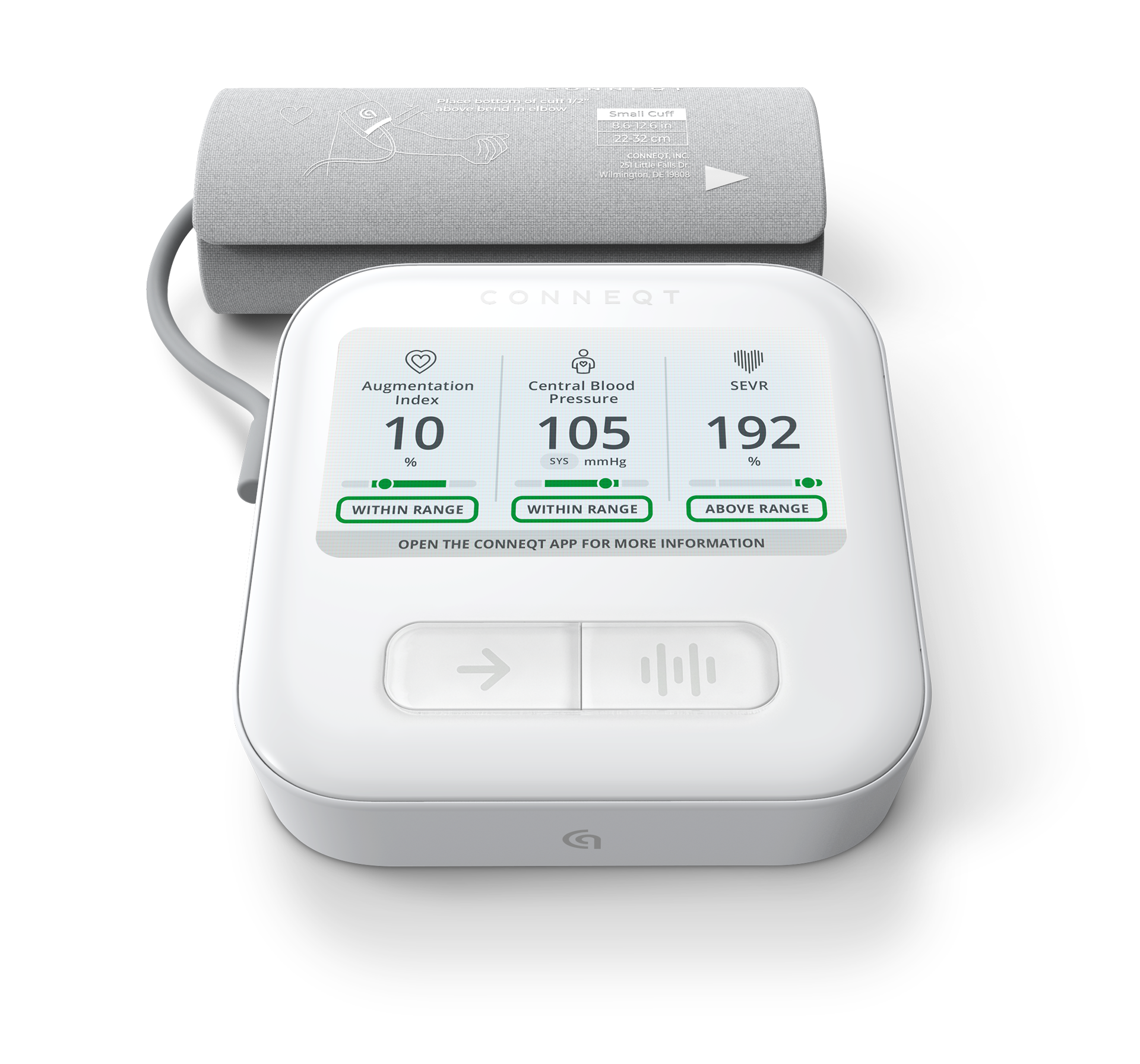Most people are familiar with the standard medical advice given to improve cardiovascular health: Eat well, exercise daily, cut down on sodium, and don’t smoke. New research suggests that reducing stress is also critical.
In fact, the latest studies show psychological stress may be as important (if not more) in predicting poor cardiovascular outcomes than traditional risk factors, says Mass General cardiologist Michael Osborne, M.D. Among people suffering from coronary heart disease (CHD), mental stress is more likely to lead to heart attacks, strokes and other heart problems than physical stress.

Measure what matters
Save 20% on checkout with code VITALITY
Stress Is Bad For Your Heart
A 2021 study published in JAMA looked at 918 patients with heart disease to see how their bodies reacted to stress. Researchers subjected participants to standardized physical and mental stress tests to see if their hearts developed myocardial ischemia, a precursor for cardiovascular events in which blood flow to the heart is significantly reduced. They then tracked them for four to nine years.
In the years that followed, those who reacted badly to the mental stress tests fared more poorly than those who struggled with the physical test. The study participants who experienced ischemia from psychological stress tests were more likely to suffer a non-fatal heart attack or die of cardiovascular disease.
This new study supports findings from a 2004 study published in the Lancet, which looked at risk factors for heart disease among 24,767 patients from 52 countries. Those who experienced a high level of psychological stress during the year preceding the study were more than twice as likely to suffer a heart attack during an average follow-up of five years, even when traditional risk factors were taken into account.
Are You Hard Wired for Stress?
A 2017 study showed that people with overactive amygdalas—the part of the brain that responds to real or imagined threats—were more likely to develop cardiovascular disease. None of the 293 subjects suffered from cardiovascular disease initially. At the beginning of the study, they each underwent full-body scans that included brain activity.
Five years later, the participants whose earlier neural imaging showed heightened activity in the amygdala had higher levels of inflammation and atherosclerosis.
Dr. Osborne and his colleagues at Mass General are using advanced imaging to show an association between increased metabolic activity in the amygdala and inflammation throughout the body, impaired metabolism, inflammation of the arteries and heightened risk for cardiovascular events.
Stress is a Global Epidemic
Americans have been stressed out for a long time, and the problem is just getting worse. In a 2014 study entitled, “The Burden of Stress in America,” 49% of the 115 million adults surveyed reported having experienced a major stressful event in the past year. Seventy-two percent regularly experienced financial stress and 60% reported job-related stress.
And that was before the global pandemic, not to mention years of political and civil unrest.
In March 2022, 63% of Americans surveyed said their life has been forever changed by the pandemic, according to the American Psychological Association’s annual survey, “Stress in America.”
American adults also reported feeling mentally overwhelmed and fatigued, with 87% agreeing that it “feels like there has been a constant stream of crises without a break over the last two years.”
Understanding the Fight or Flight Response
When a person experiences stress, the brain’s fear center, the amygdala, prompts the sympathetic nervous system (SNS) to secrete cortisol, activating a “fight or flight” physiological response: the heart beats more quickly, respiratory rate increases and blood vessels constrict, causing blood pressure to surge, Dr. Osborne explains. In prehistoric times, this helped the body respond to acute threats to survival (i.e. a bear entering your cave looking for lunch).
In modern times, where we are bombarded with a steady drumbeat of non-life-threatening stressors, this hardwired physiological response is less adaptive. As cortisol floods the body, it sets off a chain reaction of inflammation, which underlies many chronic disease states, both physiologic (cancer, diabetes, cardiovascular disease) and psychological (anxiety and depression).
How Stress Damages the Heart
The cascade of stress hormones triggered by the amygdala causes inflammation in the arteries, which interferes with clotting and damages blood vessels, illustrating the link between stress and heart disease. These changes promote atherosclerosis, the arterial disease that leads to many heart attacks and strokes.
How to Reduce Stress
While you may not be able to completely change the way your body is genetically wired to respond to stress, understanding the link between stress and heart disease can highlight the importance of stress-reducing activities that may help rewire certain key pathways.
1. Exercise Regularly
Physical inactivity leads to the accumulation of dangerous abdominal fat, Dr. Osborne says. This impairs metabolism and increases inflammation throughout the body. By contrast, exercise induces an anti-inflammatory environment by modifying the release of inflammatory cells and factors into the bloodstream.
Another compelling reason to slip on your running shoes is the impact exercise could have on a twitchy amygdala: “Exercise may contribute to beneficial modifications in stress-associated brain regions that contribute to an unhealthy stress response,” Dr. Osborne says.
Numerous studies and meta-analysis have shown a strong connection between regular exercise and reduced anxiety. Current guidelines recommend 150 to 300 minutes per week of moderate-intensity exercise or 75 to 150 minutes weekly of vigorous exercise—or a combination of the two. If you can’t carve out the full recommended 150-300 minutes, don’t sweat it: “Any amount of time spent on these activities is likely beneficial,” Dr. Osborne says.
2. Cut Down on Caffeine
Caffeine stimulates the fear-sensitive amygdala, according to a 2011 study. Researchers gave 14 healthy male volunteers either 250 mg of caffeine or placebo capsules. They then looked at brain blood flow in different regions as the subjects viewed menacing or neutral faces.
The study showed that caffeine lit up the amygdala. Caffeine also interferes with the brain region that normally helps modulate anxiety.
But don’t worry, you can still drink a little coffee: Most studies show that less than 100 mg of caffeine (the average amount in one 8-ounce cup of coffee) has little or no effect on anxiety.
3. Eat a High-Fiber, Gut-Friendly Diet Rich in Omega Fatty Acids
Dietary fiber found in beans, legumes and fruits and veggies decreases inflammation throughout the body, including the brain. Fiber helps gut microbiota thrive.
Omega fatty acids found in wild salmon, chia seeds and walnuts also decrease inflammation. Fermented foods, like kimchi and sauerkraut and yogurt with live cultures help promote healthy gut function, thereby decreasing anxiety.
4. Sprinkle on some turmeric
The golden spice has been shown to help lower anxiety. Combining turmeric with a pinch of black pepper makes turmeric more bioactive (that is, available for use by your brain and body). Keep in mind: You are better off using the space as a condiment rather than a supplement because there have been some recent reports of liver toxicity when turmeric is consumed at very high levels.
5. Avoid Artificial Sweeteners
The chemicals in artificial sweeteners can increase “bad” gut bacteria, negatively affecting mood and increasing anxiety. Sweeteners like aspartame have been more directly linked with increased levels of anxiety.
6. Practice Mindful Meditation
A comprehensive meta-analysis involving 209 studies found mindfulness-based therapy was effective for reducing stress, anxiety and depression. Counting your breaths is a good way to do it, according to a study of more than 400 people from the University of Wisconsin. Participants were asked to count nine breaths in sequence by tapping one computer key for the final breath in each sequence.
Those who were most successful at the exercise, which required a sustained awareness of the breath, measured higher on scores for positive mood. Aim for 20 minutes per day to maximize the stress-reducing impact, Dr. Osborne says.
7. Drink in moderation
While drinking small amounts of red wine (one glass daily for women and two glasses for men) may offer some heart-health benefits and could even reduce stress, excessive drinking worsens anxiety and depression.
Drinking, especially late at night, can also disrupt sleep, which may already be compromised in people who suffer from anxiety.
8. Master Diaphragmatic Breathing
When you breathe normally, you don’t usually use your lungs to their full capacity. Diaphragmatic breathing, also known as deep belly breathing, trains your body to breathe more efficiently by using your lungs to their full capacity.
People should practice this breathing exercise for 5–10 minutes at a time, around three to four times each day. In addition to reducing blood pressure and heart rate, studies show deep breathing can reduce stress.
9. Spend Time Outdoors in Nature
A 2015 study tracked 60 people taking a 50-minute walk in either an urban or natural setting near Stanford, CT. In psychological assessments taken after the walk, the tree huggers scored higher than the urban walkers in multiple measures of stress, with decreased anxiety, less rumination and negative mood.
10. Improve your sleep hygiene
Poor sleep increases stress and promotes inflammation. The Sleep Foundation recommends committing to a consistent bedtime that provides at least eight hours of sleep (yes, even on weekends) and avoiding exposure to stimulating blue light from electronics two to three hours before bed.
11. Connect With Others
Studies show nurturing close relationships promotes emotional resilience and decreases isolation and loneliness.
12. Stop checking your email all the time
A recent study by the University of British Columbia involving 124 people examined how checking email affected stress levels. One group was asked to check their email 3 times a day and the other half were advised to check their in boxes as often as possible. Not surprisingly, after one week, the less twitchy group reported being less stressed out than the obsessive email checkers.






